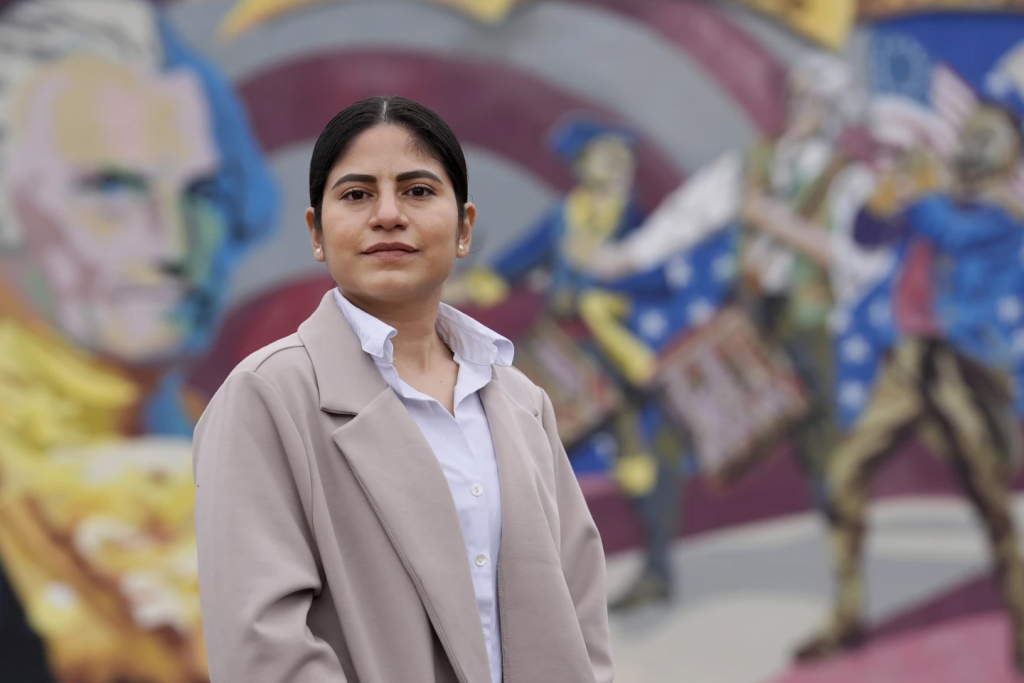
Photo Courtesy of AP
TRACY, Calif. — Just days before the new year, Michel Bérrios made the difficult decision to leave the United States, handing President-elect Donald Trump’s campaign for mass deportations a small victory even before it officially began.
Bérrios, a former leader of a Nicaraguan student uprising, had been living legally in the U.S. under President Joe Biden’s use of humanitarian parole, which allowed citizens from certain vulnerable countries to stay temporarily. However, the harsh rhetoric of the election campaign brought back troubling memories of hiding from authorities back home in Nicaragua, where she had faced persecution for her activism.
Despite her legal status and nearly a year left under Biden’s protection, Bérrios decided to leave, joining a growing number of people who are departing the U.S. out of fear of what a Trump administration could mean for their futures. Immigration advocates and experts note that while there’s no formal data on these departures, history shows that periods of political backlash can lead migrants, both with and without legal status, to flee the country.
Trump and his allies have long promoted the idea of “self-deportation,” creating conditions so intolerable that migrants will leave voluntarily, without the government needing to spend money on mass deportations.
“Because the U.S. isn’t a third-world country like the ones many of us come from, I thought there would be a different culture here. It was a rude awakening to realize that you and your family are not welcome,” Bérrios, 31, said just before she left.
The Trump Effect: Self-Deportation in Action
The law that has contributed to Bérrios’ decision comes from a bipartisan bill passed last year and signed by President Biden, which mandates that ByteDance, TikTok’s Chinese parent company, divest the app’s U.S. operations by January 19 or face a ban. While the law focuses on national security concerns, it has sparked fear among many temporary residents like Bérrios, who now face uncertainty about the future of their legal status.
Bérrios had been living with her cousin in California, working at an auto repair shop, but her sense of security quickly evaporated after Trump’s election. Anti-immigrant comments from her colleagues made her uncomfortable, and the memory of life under Nicaragua’s repressive government resurfaced.
In Nicaragua, Bérrios had spent years in hiding during a crackdown on student-led protests against President Daniel Ortega. After clashes between protesters and government forces left several dead, Bérrios became a key figure in the resistance. Government forces labeled her and other protesters as “terrorists,” with many imprisoned, tortured, or stripped of citizenship. Bérrios eventually fled, seeking refuge in the U.S., hoping for peace of mind.
A New Chapter in Ireland
When it became clear that her status in the U.S. might soon be in jeopardy, Bérrios made the difficult decision to leave once more. Returning to Nicaragua was not an option. In December, she chose to settle in Ireland, where she had connections from her time in the student movement.
“I felt like Ireland was a country of opportunity,” Bérrios said. Ireland’s asylum process, which is generally faster and less hostile than in some other European countries, offered her a sense of stability.
Upon arrival in Dublin, Bérrios applied for humanitarian protection. After a brief interview, she was granted temporary identification and placed in a government-funded hotel with other asylum seekers. She is now waiting for her work permit and plans to enroll in school as she navigates the asylum process, which could lead to permanent residency within a year.
Facing an Uncertain Future
Bérrios’s story is part of a larger trend of individuals caught between legal ambiguity and political uncertainty, a situation that leaves them vulnerable to both fear-driven exits and the risks of deportation. For many, like Bérrios, the choice is simple: leave or face an uncertain future under policies they fear will only grow more hostile.
“I made sacrifices and hoped things would turn out as planned. Maybe not exactly as I envisioned, but pretty close,” Bérrios said. “Now, I have a new chance — a chance for peace of mind and a future that’s not defined by fear.”
While her journey took an unexpected turn, it’s one that many migrants like Bérrios are now facing, caught between the policies of the past and an uncertain future.




